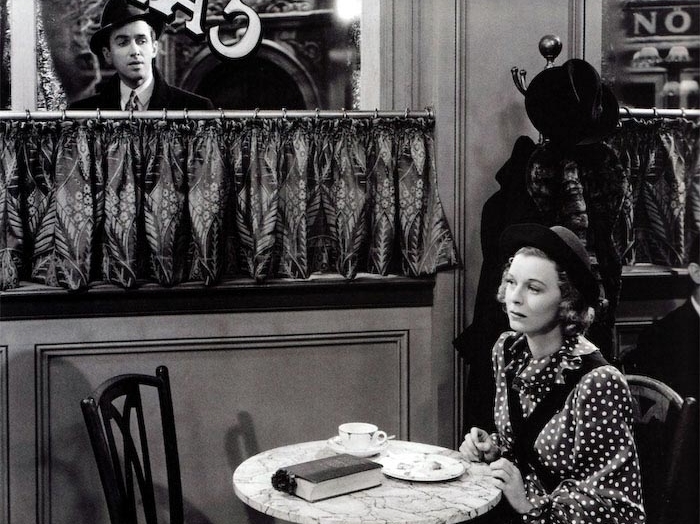
Two employees at a gift shop can barely stand one another, without realizing that they’re falling in love through the post as each other’s anonymous pen pal.
Alfred: There might be a lot we don’t know about each other. You know, people seldom go to the trouble of scratching the surface of things to find the inner truth.
Klara: Well I really wouldn’t care to scratch your surface, Mr. Kralik, because I know exactly what I’d find. Instead of a heart, a hand-bag. Instead of a soul, a suitcase. And instead of an intellect, a cigarette lighter... which doesn’t work.
“The Shop Around the Corner is different from other Lubitsch comedies like Trouble in Paradise (1932) and Ninotchka (1939) because it is purposefully non-glamorous. I mean, sure, James Stewart and Margaret Sullavan are glamorous without even doing anything. But the story goes that Lubitsch wanted this film to be different – no elegant costumes, or eccentric wealthy main characters or elaborate sets. Lubitsch reportedly had Sullavan buy a dress off the rack and then set it out in the sun to give it a worn look. The Shop Around the Corner feels very working-class and thus more believable. The ‘Lubitsch touch’ doesn’t need any external signifiers of wealth to be glamorous and sophisticated. The ‘Lubitsch touch’ comes from characters and his clockwork direction.”
Manish Mathur1
“I’ve written all of this without talking about the main attraction: Jimmy Stewart and Margaret Sullavan. They are a match made in Hollywood heaven. And it is precisely because these two awkward, incredibly fragile misfits transcend the surface impressions they give off. Despite his easy-going rapport and 22 years of experience at Matuschek and Co., Stewart plays a man with grave self-doubts, his excessively lanky body a burden and a bale. Likewise, Sullavan’s wet eyes and the nervous way she bites into her lower lip don’t speak to her subtle strength and determination. Her thin, reedy, smashed-china voice sounds like it’s about to burst into tears at any second, but it rarely does. In their exceptionality and star power, Sullavan and Stewart ooze genuineness. Think back to the café scene, where Margaret Sullavan is waiting to meet her pen pal; instead, her louse of a coworker (her pen pal!) shows up. Listen to the quick, instinctive haste and desperation Sullavan expresses to Stewart (and to us) when she begs him to leave her table, in that pained, strained voice of hers: ‘R. Kralik! Please! I was expecting somebody … ’ Each sentence has its own distinct flavor, from anger to flustered nervousness to the lonely realization that you’ve been stood up. Sullavan conveys all of this in only three seconds. It’s the magic of performance.”
Carlos Valladares2

“What’s especially striking about the film’s humor is the vein of real, deep sadness that runs through the center of it. There’s a sense of loneliness in both Kralik and Karla, who separately believe they’ve found love in the form of someone they’ve never even met face-to-face, someone they’ve only corresponded with through letters. There’s more than a hint of desperation in both characters: they invest so much into their romance-by-pen, as though it represents the last chance they each have for happiness or romance. In the process, they don’t realize that the object of their love is right in front of them every day, that their relationship consists of sparring angrily by day and writing loving, romantic letters to one another by night. As such, the film is about the ideal of love as contrasted against the more prosaic but also more tangible reality: it’s telling that before Kralik can reveal himself to Karla, he must adjust her expectations downward by shattering the fantasy of the letters, preparing her not only for the revelation that he’s her great love, but that her great love is only a flesh-and-blood man after all.”
Ed Howard3
- 1Manish Mathur, “The Shop Around the Corner: The Grand Budapest Gift Shop”, Brattle Film, 31 July 2015.
- 2Carlos Valladares, “Perf romance: Ernst Lubitsch’s ‘The Shop Around the Corner’ at the Stanford Theatre”, The Stanford Daily, March 15, 2017.
- 3Ed Howard, “Films I Love #55: The Shop Around the Corner”, Only the Cinema, 19 October 2011.

